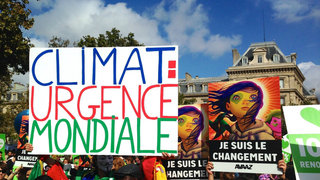
One of the most impassioned speeches at the U.N. Climate Change Conference last week came from the head of the delegation of Tuvalu, the small Pacific island nation. “We cannot afford to have endless meetings,” said Enele Sopoaga, Tuvalu’s Deputy Prime Minister and Minister for Foreign Affairs, speaking at the main U.N. plenary in Cancún. “Most importantly, we cannot afford to be held hostage by countries finger-pointing on climate change, particular those who cause climate change… This is a ‘life and death’ survival issue for Tuvalu.” The Alliance of Small Island States, including Tuvalu, signed on to the agreement reached over the weekend called the Cancún Accord. [includes rush transcript]
Transcript
AMY GOODMAN: As many in civil society felt marginalized and iced out, there were those inside the U.N. summit who also were expressing their deep concern, like the head of the delegation of Tuvalu, the small Pacific island nation that, among — like many small nations face, are on the frontlines of global disruption. This is Enele Sopoaga, Tuvalu’s deputy prime minister and minister for foreign affairs, speaking at the main U.N. plenary in Cancún.
ENELE SOPOAGA: Mr. President, last year we went to Copenhagen with high expectations that the international community would take decisive steps to address one of, if not the most, serious threats to humanity: climate change. We were extremely disappointed with the outcome of Copenhagen. It is a tragedy to think that over 110 heads of state could not unite to tackle climate change in a meaningful way. In Copenhagen, we rejected the Copenhagen Accord, and we continue to do so. In our view, it is a hollow agreement to meet short-term political needs. Certainly it is a document for the demise of nations like mine.
Tuvalu was keen to see a meaningful outcome in Copenhagen that — though small and limited in our capacity as the delegation as we are, but as a contribution, we drafted our own version of a new protocol on climate change. Tragically, however, we were never able to have this proposal discussed.
This year, we have come to Mexico with renewed expectations that the international community will not repeat Copenhagen. We must unite in strong solidarity and be decisive on meaningful steps to address climate change here.
Tuvalu seeks a clear mandate to continue the Kyoto Protocol and a new mandate to create a legally binding agreement to implement the Bali Action Plan. We must agree to an immediate start of the second commitment period of Kyoto Protocol. The two-track processes must result in two legally binding agreements. It is fundamental that the international community agrees to a comprehensive approach to addressing climate change. And this can only be done by revitalizing the Kyoto Protocol and creating a new protocol for those countries not included in the Kyoto.
Mr. President, Tuvalu’s call for urgent, decisive and comprehensive actions on climate change is not self-serving. Undoubtedly, we are the most vulnerable country to the impacts of climate change. The greatest width of land on Funafuti, our capital island, is 600 meters. The highest point is only four meters. When a cyclone hits, there are no mountains to climb, no inland to run to. Of course, we have coconut trees. We are extremely exposed to ravages of climate change.
We see that many other countries are claiming that they are also the most vulnerable. Of course, while clearly acknowledging that all countries are vulnerable to the impacts of climate change, a small island, coral atoll nation like Tuvalu faces enormous threats that could threaten the entire future of our nation. This was resoundingly echoed in the UNFCCC executive secretary’s statement to this house yesterday. Is there any other country able to make this tragic claim? I think not.
Clearly, addressing climate change, especially providing adaptation funding and support, is fundamental to the survival of island nations like Tuvalu. It is certainly a necessity, a security necessity, for Tuvalu.
As an LDC, moreover, the entire economy of our nation is threatened by severe weather events. Yet we have no means to rebuild our economy after such events. We desperately need an international mechanism to address loss and damage to create the necessary financial arrangement to ensure our future.
We have already heard in this very hall references to the Gap Report recently released by UNEP, identifying actions required to bridge the gap between the totally inadequate emission reduction pledges made in Copenhagen and the actions needed to ensure global temperature does not exceed 1.5 degrees centigrade above pre-industrial levels. My delegation strongly urges parties to seriously take into account the Gap Report findings and its recommendations in their negotiations. The gaps identified, if not urgently filled, could well lead to my nation, Tuvalu, and many like us to disappear.
Mr. President, I must emphasize the importance of urgency. We cannot continue to stall our discussions. We cannot afford to have endless meetings and endless reasons for not doing anything. Most importantly, we cannot afford to be held hostage by countries finger-pointing on climate change, particularly those who cause climate change. And we cannot afford to be held hostage by the political backwardness of one developed country. This is “life and death” survival issue for Tuvalu. It is now time to act, time to agree, time to move forward, time to save Tuvalu and the world. Thank you, Mr. President.
AMY GOODMAN: That was Enele Sopoaga, Tuvalu’s deputy prime minister.












Media Options